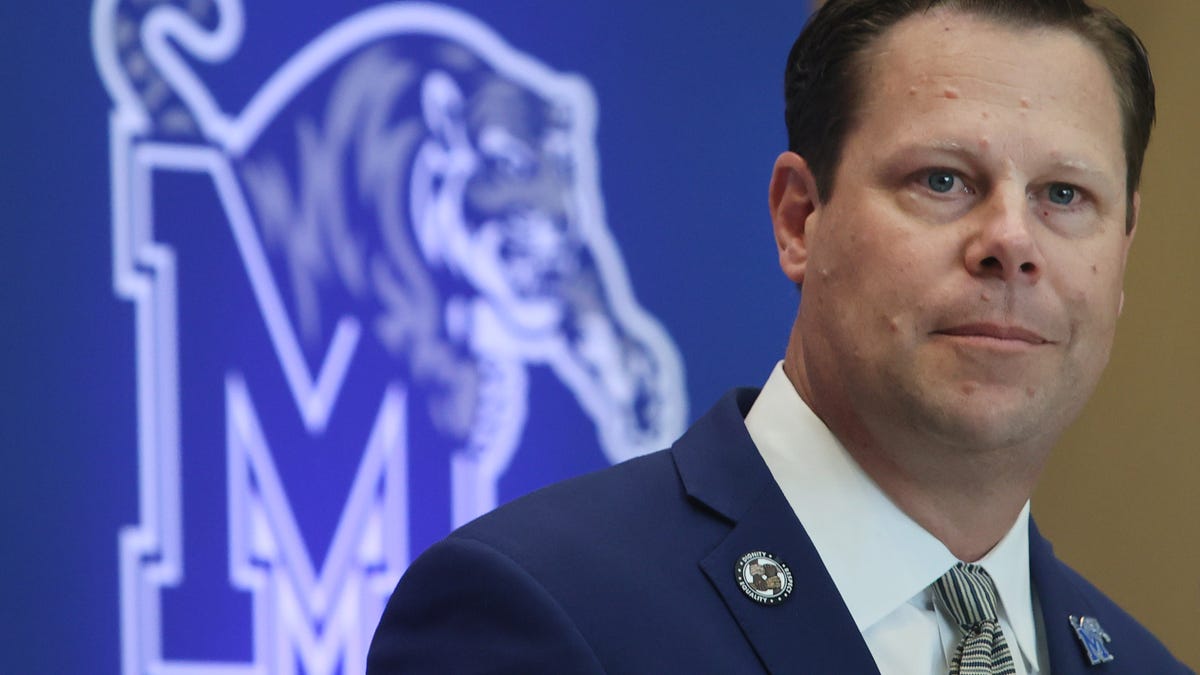Missouri
New Missouri athletic director Laird Veatch has contract approved. Here are the details

That’s that.
The UM System Board of Curators officially approved the contract of new Missouri athletic director Laird Veatch during a special meeting on Wednesday afternoon, a university spokesperson confirmed to the Columbia Daily Tribune.
The curators quickly went into an executive session in their 3 p.m. meeting, with four statutes cited to take the meeting behind closed doors. One of them — 610.021(3) RSMo — concerns “hiring, firing, disciplining or promoting of particular employees by a public governmental body.”
Guess who?
Veatch is now officially Missouri’s athletic director.
Here are the details of his five-year contract, provided in a memorandum of understanding signed Tuesday, April 23, and sent to the Columbia Daily Tribune by a university spokesperson.
What is Missouri athletic director Laird Veatch’s salary?
Laird Veatch will earn $1.3 million dollars in annual guaranteed compensation at Missouri. His deal is due to end April 30, 2029.
His deal is broken down into three parts: Base salary ($900,000 per year); Non-Salary compensation ($200,000); and deferred compensation ($200,000).
Both his base salary and non-salary compensation will be paid in equal monthly installments. His deferred compensation will be paid annually.
Veatch’s deal also includes several merit incentives.
The new Missouri athletic director can earn $50,000 if Missouri wins an SEC football title, and can add another $50,000 if Eli Drinkwitz’s team claims a national championship.
For men’s basketball, Veatch is awarded $10,000 if Dennis Gates’ Missouri team wins an SEC title; a further $15,000 if the Tigers make the Final Four; and an additional $25,000 if they take home a national title.
If Missouri student-athletes graduate at a 90% combined success rate across all sports, Veatch makes $25,000. If Veatch reaches “philanthropy, ticket sales and other revenue generation targets set annually” by UM System President Mun Choi, Veatch earns $75,000. Those targets are currently unknown.
Before leaving for the open AD role at Arizona, former Missouri athletic director Desireé Reed Francois signed a contract extension with Missouri in April 2023 that saw her total compensation jump to $1.25 million annually. Her Missouri annual contract was broken down as $900,000 in base salary; $350,000 in non-salary compensation; and $250,000 in deferred compensation. She was only eligible to receive the deferred compensation at the end of her deal.
Veatch is Missouri’s fourth athletic director in the past nine years. The university also put in a clause that makes sure it isn’t searching for No. 5 any time soon.
The contract states that “the AD recognizes that their promise to work for the University for the entire term is important to the University, and that the nature of their position is unique.”
On that note, the contract also stipulates that should Veatch choose to terminate his deal without cause, he will pay the university 50% of his cumulative base salary plus whatever he would have been paid in non-salary compensation.
That means, if he leaves for another job with, for example, one year remaining on his deal, he would owe $450,000 (half of his base salary) plus $200,000 in non-salary compensation for a total of $650,000 in liquidated damages. The cost of leaving Missouri begins at about $3.25 million and falls each year for Missouri’s new AD.
On the flip side, and very similarly, if Missouri terminates Veatch’s contract without cause, the university owes Veatch half of his annual base salary plus the full amount he would have received in non-salary compensation. Veatch also would be paid whatever he had accrued in deferred compensation. That means his buyout begins at approximately $1.65 million, which will fall with each passing year.
What’s next for Veatch?
Veatch, who MU hired away after a near-five-year stint at Memphis, could be introduced to the public as soon as Friday. His official start date is May 1.
More: 3 questions facing new Missouri athletic director Laird Veatch on Day 1
The new head of the Missouri athletic department returns for a second stint in Columbia, after serving in various roles for MU in the late 1990s and early 2000s. At Missouri, Veatch held titles such as assistant AD for development; director of athletics development for major giving; and director of annual giving and development coordinator. He also worked for Learfield Sports, managing Mizzou Sports Properties between 2003-06.
Veatch is a former Kansas State linebacker and team captain under Hall of Fame head coach Bill Snyder. The new Missouri AD has worked in athletic departments at Memphis, Florida, Iowa State, Texas and his alma mater K-State.
The university formed an 11-person search committee and hired the search firm TurnKey ZRG to find its next AD.
Veatch will undertake a $250 million redevelopment to the Memorial Stadium north concourse, with the athletic department poised to foot half of that bill and a considerable chunk of those funds still needing to be raised.
The Missouri football team itself, however, appears to be in its most stable position in a decade. The Tigers went 11-2 last season, a year that culminated in a Cotton Bowl victory over Ohio State, before extending Drinkwitz through the 2028 season.
In Mizzou Arena, Gates and the men’s basketball team are coming off a historically poor season with a historically successful recruiting performance. The Tigers have one of the nation’s top transfer classes and will bring the country’s No. 4 high school class to Columbia this summer. Veatch likely will face questions about MU women’s basketball coach Robin Pingeton, who has entered the final year of her contract.
More: 5 things to know about new Missouri athletic director Laird Veatch

Missouri
Baseball Opens Missouri Series with 10-2 Win

COLUMBIA, Mo. – The University of South Carolina baseball pitching staff struck out 17 batters and Cole Messina led the Gamecocks with five RBI in a 10-2 win over Missouri Friday night (May 3) at Taylor Stadium.
Messina was 2-for-4 with a two-run double in the fifth and a three-run home run as Carolina scored five times in the eighth. Talmadge LeCroy had three hits on the night and drove in two. Ethan Petry scored three runs and hit his 40th career home run, a solo shot to start the scoring in the second.
Ty Good earned the win on the mound, striking out seven in four innings of one-hit relief. Good, Roman Kimball, Garrett Gainey, Parker Marlatt and Tyler Dean combined to strike out 17 with Gainey punching out five in 2.1 innings.
Missouri took a 2-1 lead in the second on back-to-back solo home runs but Carolina scored one in the third to tie it, two in the fifth to take the lead, one in the sixth and the five-spot in the eighth.
POSTGAME NOTES
- Carolina has won four straight against Missouri, dating back to 2023.
- Carolina scored in double digits in runs for the fourth straight game.
- The Gamecocks had six extra-base hits on the night.
- The 17 strikeouts are tied for the season high for the Gamecocks. Carolina also struck out 17 against Queens on Feb. 21 and Georgia Southern on April 3.
UP NEXT
Carolina and Missouri continue the three-game set on Saturday afternoon (May 4) at 4 p.m. EDT (3 p.m. CDT). The game will be streamed on SEC Network Plus.
Missouri
A warning for southwest Missouri cattle farmers: watch for black vultures

SPRINGFIELD, Mo. (KY3) – Black vultures are ruffling the feathers of cattle farmers across south and central Missouri.
Farmers in the Ozarks say the vultures are killing newborn calves and other small cattle. Brian Nimmo has had this farm in his family for more than 100 years. He says it’s more than his livelihood.
“I’m speaking for all producers about you take this personally because you’ve raised these,” said Nimmo. “Like all these heifers were home-raised, they go back to my grandparents, and I got my first cow in 1982. And some of that lineage goes back to them.”
One day Brian noticed one of his cows crying out for its baby. He found that it had been ripped apart by black vultures.
“The calf was still alive, we’re able to bring it home, we had to euthanize it,” said Nimmo. “So that cows lost her production for the year. So at that point, you either keep her on and carry her through, even though she’s not producing and or seller, and take your hit that way.”
Nimmo and cattle producers around the areas of south and central Missouri are taking steps to scare off the birds to protect their calves, the experts at the USDA say you’ll want to take as many of those steps as you possibly can.
“You know, having early calving season is one time having a herd mentality during calving,” said Dan McMurtry, district supervisor for USDA Wildlife Services. “Another thing, pull your bull have short calving season, harass them with pyrotechnics. So we have products called pyrotechnics.”
After his calf was killed he was reimbursed up to $200 for the vet bills and necropsy and has the cows much closer to the home. It’s important to note that farmers *must take their animal to the vet — within 24 hours to get that re-imbursement. The money is capped at 200 dollars for each positive result for the test showing the animal’s death was caused by a black vulture.
He says he’ll monitor dead trees on his property, monitor any newborn calves closely and move the herd closer to the man-made structures taking the threat very seriously.
“If you just be proactive as much as you can be, you know, you monitor your herd and monitor the flight pattern of the birds see where they’re staying at,” said Nimmo. The one that we had it hit about eight o’clock in the morning, we got there at 10. So we were just about two hours behind it, but you can always be there.
According to the Missouri Department of Agriculture, some ways to help keep the birds off your farm are:
- Pen birthing livestock near human activity to enable closer observation and a quicker response to problem situations, or keep expectant animals in pastures nearest to people.
- Condense birthing time frame, so animals can be monitored closely.
- Place black vulture effigies (replicas) around calving areas to scare away live vultures. Hang them by their feet and suspend in the air, so they can be seen from a distance.
- Harass and scare black vultures away from your herds or flocks. Examples: create loud noises (horns, starter pistols, shell crackers, propane cannons), spray water, and point lasers at the roost.
- Use a guard dog to frighten and chase away black vultures.
“Black vultures are federally protected by the Migratory Bird Treaty Act of 1918. This means the birds, their nests and eggs cannot be killed or destroyed unless a permit is obtained from the Missouri Farm Bureau. Permits are free and producers can obtain up to 10 annually. Apply for a permit by contacting Julie Waldrop at Julie.Waldrop@mofb.org or (573) 893-1417. Find further permit information at mofb.org.” said the Department of Agriculture on its website.
For more information on how farmers can fight back check out the Dept. of Agriculture’s page on black vultures. Also, the University of Missouri’s extension office information can be accessed here.
To report a correction or typo, please email digitalnews@ky3.com
Copyright 2024 KY3. All rights reserved.
Missouri
Applications now open for Missouri black bear and elk hunting seasons

SPRINGFIELD, Mo. (KY3) – The Missouri Department of Conservation is accepting applications for the upcoming black bear and elk hunting seasons.
The department says black bears are becoming more common across the southern half of Missouri, to the point it says the population can sustain a limited and highly regulated harvest.
For a bear hunting license, there will be a random drawing. It costs $10 to apply, and it’s one application per year per hunter.
Hunters have until the end of May to join the drawing. Shannon County is one of the three counties where you will have a chance to participate in elk hunting.
To be eligible, you must submit an application by the end of the month. It costs $10 to apply for elk hunting, and winners will be selected through a random drawing.
To report a correction or typo, please email digitalnews@ky3.com
Copyright 2024 KY3. All rights reserved.
-

 News1 week ago
News1 week agoLarry Webb’s deathbed confession solves 2000 cold case murder of Susan and Natasha Carter, 10, whose remains were found hours after he died
-

 News1 week ago
News1 week agoFirst cargo ship passes through new channel since Baltimore bridge collapse
-

 World1 week ago
World1 week agoHaiti Prime Minister Ariel Henry resigns, transitional council takes power
-

 World1 week ago
World1 week agoSpanish PM Pedro Sanchez suspends public duties to 'reflect'
-

 World1 week ago
World1 week agoUS secretly sent long-range ATACMS weapons to Ukraine
-

 News1 week ago
News1 week agoAmerican Airlines passenger alleges discrimination over use of first-class restroom
-

 Movie Reviews1 week ago
Movie Reviews1 week agoHumane (2024) – Movie Review
-

 Education1 week ago
Education1 week agoVideo: Johnson Condemns Pro-Palestinian Protests at Columbia University
















